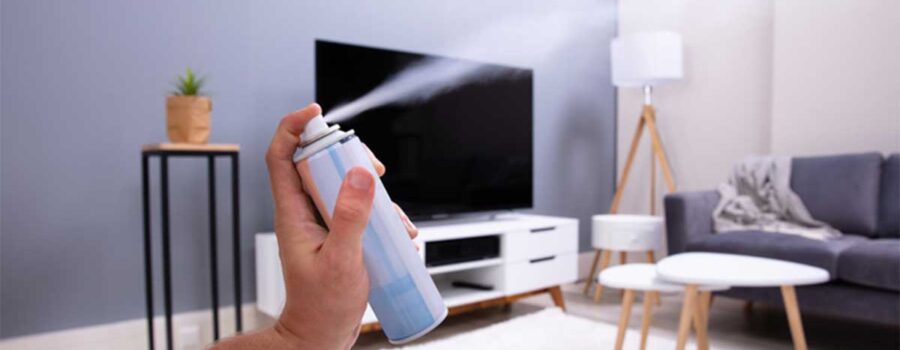As a parent myself, I know we’re always trying to make our homes smell fresh and clean, especially with the lovely aromas that sometimes come with having kids. You know, the dirty diapers, the sweaty sports gear, the spilled milk – you get the picture. That’s why we often turn to air fresheners to help mask those not-so-pleasant scents. But did you know that the very products we use to keep our homes smelling nice could actually be harming our indoor air quality and, in turn, our family’s health?
The Hidden Truth About Air Fresheners
Here’s the deal: many air fresheners contain chemicals that, while they make our homes smell better, can also pollute the air we breathe. Ryan Sullivan, a chemistry and mechanical engineering professor at Carnegie Mellon University, explains that truly clean air should have no scent at all because it contains very low levels of chemicals.
The problem with air fresheners is that they belong to a broader category of everyday products containing chemicals that can cause hormonal disruptions and respiratory issues. So, when we use air fresheners, we might be introducing harmful compounds into our living spaces without even realizing it.
What’s Lurking in Your Air Freshener?
Air fresheners are known to emit over 100 chemicals, including volatile organic compounds (VOCs) like formaldehyde, benzene, toluene, ethylbenzene, and xylenes. These chemicals can react with other compounds in the air and create secondary pollutants that worsen our indoor air quality. Not exactly what we want for our families, right?
How Air Fresheners Can Affect Our Health
The impact of air fresheners on our health can vary depending on the specific chemicals in the product and each individual’s sensitivities to them. People with asthma or allergies may be more sensitive to scented products, as reported by the Environmental Protection Agency.
Exposure to high levels of VOCs can lead to some pretty nasty health effects, like migraine headaches, asthma attacks, breathing difficulties, and even neurological problems. In the short term, exposure can irritate our eyes, throat, and nose, as well as cause nausea.
“Green” Air Fresheners: Are They Safer?
You might be thinking, “What about those ‘green’ or ‘all-natural’ air fresheners? Surely they’re safe, right?” Well, not necessarily. According to experts, air fresheners labeled as organic, nontoxic, or all-natural can still emit potentially hazardous chemicals. Plus, there’s limited data on the toxicity of different chemicals in everyday products, making it difficult to assess their safety.
So, What Should We Do?
Don’t worry; there are safer alternatives out there! The Environmental Protection Agency (EPA) recommends cutting back on the use of products with strong fragrances, especially in indoor areas with poor ventilation. They also suggest minimizing the use of sprays that spread scents throughout a space.
One great option to consider is essential oils. They can be a safer choice for adding fragrances to our homes, but it’s essential to check the ingredients before using them. Ryan Sullivan recommends looking for a short list of fully disclosed ingredients and minimally processed, naturally sourced oils. For dispersing the scent, consider using a reed diffuser or a mister-type diffuser that sprays the essential oil in water. Misting essential oils in a spray bottle can also be a safe alternative.
By being aware of the potential dangers of air fresheners and choosing safer alternatives, we can create a healthier living environment for ourselves and our families.
In Conclusion: Be a Scent-sible Parent
As parents, it’s our responsibility to create a safe and healthy environment for our kids. While air fresheners might make our homes smell more pleasant, it’s essential to consider the potential health risks associated with their use. By understanding the chemicals in these products and opting for safer alternatives like essential oils, we can protect our family’s well-being and still enjoy a fresh-smelling home.
So next time you’re shopping for air fresheners, remember to think about the air quality in your home and the health of your loved ones. Let’s be scent-sible parents and make informed choices when it comes to freshening up our living spaces. After all, a healthy home is a happy home!
Happy parenting!
References:
- Ajasa, Amudalat. “If You Can Smell Your Air Freshener, You Might Have a Problem.” The Washington Post, 22 Feb. 2023.
- Sullivan, Ryan. As cited in Ajasa, Amudalat. “If You Can Smell Your Air Freshener, You Might Have a Problem.” The Washington Post, 22 Feb. 2023.
- Steinemann, Anne. “Volatile Emissions from Common Consumer Products.” Building and Environment, vol. 93, 2015, pp. 267-277.
- Environmental Working Group. “Guide to Healthy Cleaning.” Retrieved from https://www.ewg.org/guides/cleaners/
- Miller, Claudia. As cited in Ajasa, Amudalat. “If You Can Smell Your Air Freshener, You Might Have a Problem.” The Washington Post, 22 Feb. 2023.
- Natural Resources Defense Council. “Hidden Hazards of Air Fresheners.” 2007. Retrieved from https://www.nrdc.org/sites/default/files/airfresheners.pdf








